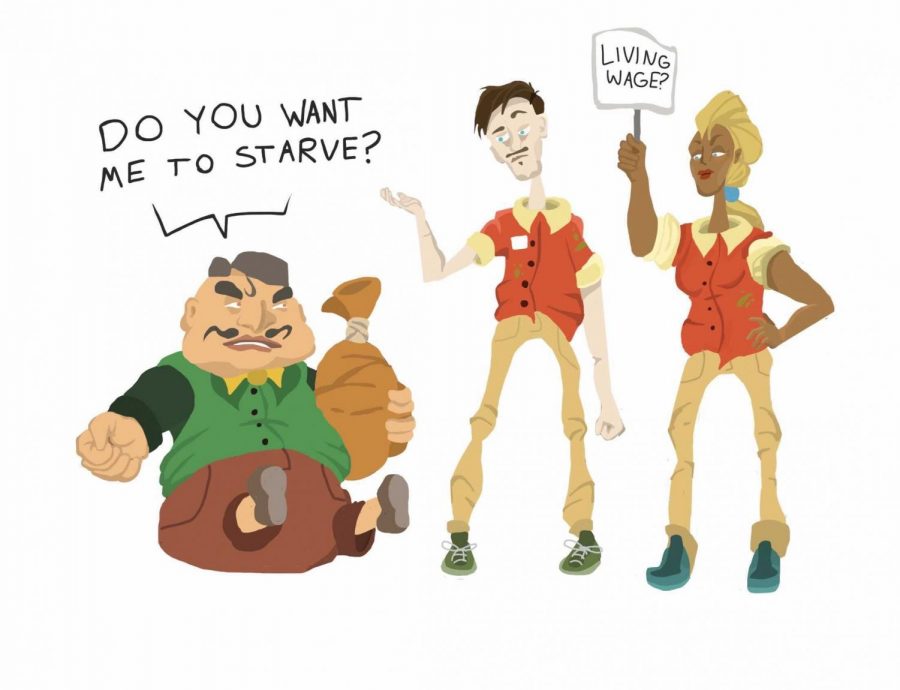Worker shortages causes worry between business owners, economists
The working class is often left to struggle while the rich get richer, even during a global pandemic, argues Co-Editor-in-Chief Renee DeMars Dehn.
An early shift on a Saturday morning. You walk in and get yourself ready. Washing your hands, getting an apron and clocking in, but before you can even complete your mental checklist, a customer impatiently asks for something. What they’re requesting doesn’t really matter—it’s the tone that they are taking at 10 a.m. over some ketchup, a discount on an expired coupon, today’s special at this location vs. another, whatever. The things that hourly workers in the service industry have to deal with are often not worth what they are making, especially with other, more appealing and less stressful options available out on the job market.
Now, with employers paying more than ever for an entry level job, one would think it would be easy for companies to find enough employees. The allegation is, however, that businesses are having to change hours or close dining rooms, as they simply do not have enough employees to stay open. In reality, with an unemployment rate of 5.4 percent (about 8.4 million people) nationwide, according to the U.S. Bureau of Labor Statistics, there are more hirable people now then there were in 2018, when unemployment was at 3.9 percent.
Now that the academic year has started, many places, particularly fast food restaurants and similar establishments that rely on teenage labor are supposedly not able to find enough staff for those hours during the school day. During the height of the pandemic, many teens were not working, causing many retail stores and restaurants to operate understaffed or limit their hours, and whether the hourly wage is worth the risk is obviously up to the potential employee, not the owner or manager.
“I very much feel pressured due to the fact that there is not as much staff,” Kiara Amezcua (12), an employee at Michoacan A Pedir De Boca, said. “It’s a very tight knit family, though.”
Dealing with COVID is also a huge factor in other people going back to work—not just those in our age bracket. With case rate numbers seemingly headed back to levels that previously caused huge shutdowns, coming into contact with hundreds of people a day, an alarming number of which may be unmasked, during a pandemic is not exactly COVID-safe, meaning frontline workers as well as those in the service industry are at increased risk. As we know, COVID is spread through coming in contact with someone with the virus, whether they are symptomatic or not. Customers passing through and/or dining at a restaurant, which they are once again free to do without masks, brings increased risk to both employees and others in the restaurant.
Another issue is that potential employees in their twenties and older are able to collect more money on unemployment, so why would they want to deal with both annoying managers and customers and earn less? In Minnesota, the minimum wage is $10.08, while unemployment nets someone $711 per week between state and federal funds. This means that, according to Business Insider, Minnesota citizens can make 176% more on unemployment then they would working full-time at minimum wage.
The incentives for employees to return are going to have to be much higher than they currently are in order for companies to be able to find enough workers. There are also many people who just prefer working from home, and if they are able to find a job where they don’t have to leave their pajama pants, they will more likely choose that one.
“I think it shows you a shift in our economy where businesses have to learn that in order to get the workers they want, they’re going to have to pay more money and higher salaries, in which case there won’t be a lack of workers due to higher salaries and benefits,” CHHS Economics teacher Mr. Dan Tschida said. “In general, higher salaries will have a positive effect on our economy because it should redistribute wealth more towards regular people.”
For many adults, there is also the issue of childcare, especially with some children still doing online school. With young kids to care for, having a parent able to work from home can be much more convenient and save on childcare costs. When many businesses had people working from home at the same time that children were learning from home, parents were able to both oversee their learning and keep them safer during the pandemic while also earning a paycheck remotely.
Employers are not going to be able to fully staff their companies until they start providing more benefits and increase the pay of workers, especially those in the retail and service sectors. Until the wealth gap dissipates between those that work and those that exploit workers’ labor, there will be a large dissonance between the classes in this country.

Renee DeMars Dehn is currently a senior at Columbia Heights High School and the Co-Editor-in-Chief of The Heights Herald. This is their third year on the...

Simon Graves is a senior and a Staff Writer and Illustrator for The Heights Herald. He is a part of the NHS, Key Club, Pep Band, and an avid member of...







